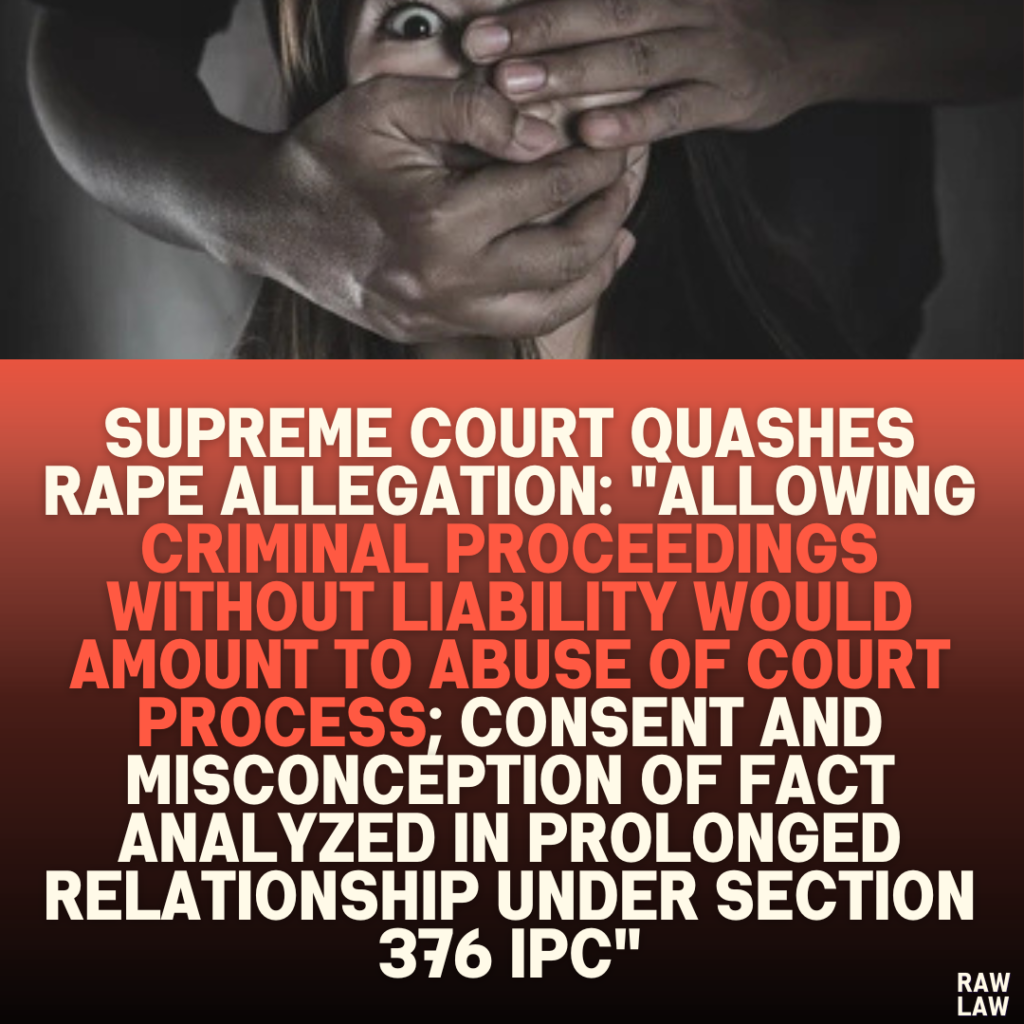Court’s Decision
The Supreme Court quashed the FIR against the appellant under Sections 376, 420, 504, and 506 IPC, ruling that the allegations lacked prima facie evidence to establish the charges. The Court found that the relationship between the appellant and the complainant was consensual and that criminalizing such prolonged relationships, especially when consent was apparent, would lead to a misuse of criminal law.
The Court observed:
“Allowing the criminal proceeding against the appellant in the facts and circumstances to continue, where no criminal liability can be attached, would amount to abuse of the process of court.”
Facts
- Relationship and Allegations:
- The appellant, a social worker, and the complainant were acquainted since 2008. The complainant claimed that the appellant initiated a sexual relationship with her by falsely promising marriage.
- This relationship spanned nearly a decade, ending in 2017 when the appellant allegedly stopped financial assistance and refused to marry her.
- Complaints Filed:
- The complainant filed an FIR in 2017 under Sections 376 (rape), 420 (cheating), 504, and 506 IPC. She alleged that the appellant had sexually exploited her under the guise of marriage.
- A second FIR alleged molestation of the complainant’s daughter under Section 8 of the POCSO Act.
- Lower Court Observations:
- The appellant was granted anticipatory bail in both FIRs, with the sessions court noting that the prolonged relationship suggested consensual involvement rather than forcible acts.
Issues
- Whether the allegations in the FIR constituted offenses under Section 376 IPC, considering the long-term relationship and claims of a false promise to marry.
- Whether the appellant’s promise to marry, if proven false, could vitiate the complainant’s consent under Section 90 IPC.
Petitioner’s Arguments
- The appellant argued that the complainant willingly engaged in a long-term consensual relationship and raised allegations only after the cessation of financial support and his refusal to marry.
- He claimed the FIR was an abuse of process and highlighted the absence of any protests or complaints from the complainant during their decade-long relationship.
Respondent’s Arguments
- The State contended that the allegations raised questions of fact that required investigation and trial.
- It opposed the quashing of the FIR, arguing that the charges under Section 376 IPC warranted thorough examination.
Analysis of the Law
- Section 482 CrPC:
- The Court reiterated the scope of this provision, which grants High Courts the power to quash FIRs to prevent abuse of legal processes or secure the ends of justice. This power, however, must be exercised sparingly.
- The Court referred to State of Haryana v. Bhajan Lal, which outlined exceptional cases where FIRs could be quashed, including instances where allegations lack a prima facie case or are motivated by malice.
- Consent and Section 375 IPC:
- Section 375 IPC defines rape, including sexual acts committed without the woman’s consent.
- Section 90 IPC clarifies that consent obtained under a misconception of fact is not valid. The complainant alleged that her consent was vitiated due to the appellant’s false promise of marriage.
- Previous Precedents:
- In Deepak Gulati v. State of Haryana, the Court distinguished between a breach of promise and a false promise made with deceitful intent.
- Pramod Suryabhan Pawar v. State of Maharashtra held that prolonged consensual relationships do not constitute rape unless the promise to marry was false from the beginning.
Precedent Analysis
- The Court examined various cases to highlight the distinction between:
- False promises made with deceitful intent to exploit.
- Breach of a promise due to changed circumstances, which does not constitute criminal liability.
- The Court emphasized that allegations must be supported by evidence indicating mala fide intent from the outset.
Court’s Reasoning
- Prolonged Consensual Relationship:
- The decade-long relationship between the appellant and the complainant, without objections or protests, indicated consent.
- The complainant’s allegation of false promises emerged only after the relationship ended, suggesting ulterior motives.
- Misuse of Criminal Law:
- The Court noted a troubling trend of consensual relationships being criminalized after they sour. It emphasized the need for judicial caution to avoid misuse of criminal provisions for personal disputes.
- Lack of Prima Facie Evidence:
- The Court found no evidence to substantiate the claim that the appellant’s promises of marriage were false from the beginning.
- It observed:“Unless it can be shown that the physical relationship was purely because of the promise of marriage, it cannot be said that there was vitiation of consent under misconception of fact.”
- Financial Dispute as Trigger:
- The Court reasoned that the allegations were likely motivated by the cessation of financial assistance rather than genuine grievances over breach of promise.
Conclusion
The Supreme Court quashed the FIR, holding that:
- The allegations lacked prima facie evidence of rape or other offenses.
- The prolonged consensual relationship indicated mutual consent rather than deceitful exploitation.
- Allowing the criminal proceedings to continue would constitute an abuse of legal process.
The Court clarified that its decision was specific to the facts of the case and did not set a general precedent for similar disputes.
Implications
- The judgment reinforces the principle that prolonged consensual relationships cannot be criminalized in the absence of clear evidence of deceit or coercion.
- It underscores the importance of distinguishing between false promises and genuine changes in circumstances to prevent misuse of legal provisions.
- The ruling sets a cautionary tone for future cases, emphasizing judicial scrutiny in allegations arising from complex human relationships.
